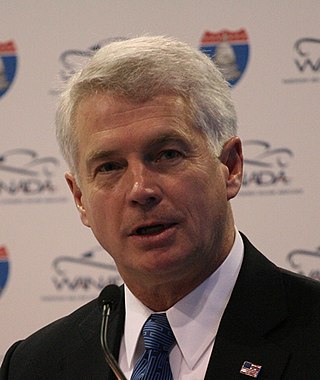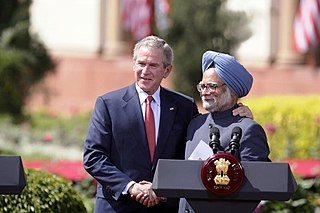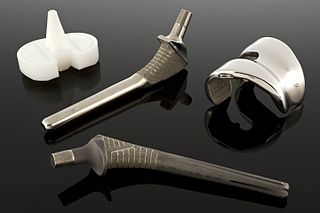
Biomedical engineering (BME) or medical engineering is the application of engineering principles and design concepts to medicine and biology for healthcare purposes. BME is also traditionally logical sciences to advance health care treatment, including diagnosis, monitoring, and therapy. Also included under the scope of a biomedical engineer is the management of current medical equipment in hospitals while adhering to relevant industry standards. This involves procurement, routine testing, preventive maintenance, and making equipment recommendations, a role also known as a Biomedical Equipment Technician (BMET) or as clinical engineering.
The Contract with America was a legislative agenda advocated for by the Republican Party during the 1994 congressional election campaign. Written by Newt Gingrich and Dick Armey, and in part using text from former President Ronald Reagan's 1985 State of the Union Address, the Contract detailed the actions the Republicans promised to take if they became the majority party in the United States House of Representatives for the first time in 40 years. Many of the Contract's policy ideas originated at The Heritage Foundation, a conservative think tank.

William Todd Tiahrt is an American politician who served as the U.S. representative for Kansas's 4th congressional district from 1995 to 2011. A member of the Republican Party, he was elected as part of the historic Republican Wave of 1994, defeating 18-year incumbent U.S. Representative Dan Glickman. He ran in 2010 for the United States Senate seat being vacated by Sam Brownback. He lost to fellow Republican U.S. Representative Jerry Moran of Hays, Kansas, 50%–45%.

The 105th United States Congress was a meeting of the legislative branch of the United States federal government, composed of the United States Senate and the United States House of Representatives. It met in Washington, DC from January 3, 1997, to January 3, 1999, during the fifth and sixth years of Bill Clinton's presidency. Apportionment of seats in the House of Representatives was based on the 1990 United States census.

The Freedom of Information Act, 5 U.S.C. § 552, is the United States federal freedom of information law that requires the full or partial disclosure of previously unreleased or uncirculated information and documents controlled by the U.S. government, state, or other public authority upon request. The act defines agency records subject to disclosure, outlines mandatory disclosure procedures, and includes nine exemptions that define categories of information not subject to disclosure. The act was intended to make U.S. government agencies' functions more transparent so that the American public could more easily identify problems in government functioning and put pressure on Congress, agency officials, and the president to address them. The FOIA has been changed repeatedly by both the legislative and executive branches.

William John Hughes was an American politician and diplomat who served as a Democratic member of the U.S. House of Representatives from 1975 to 1995, representing New Jersey's Second Congressional District which includes major portions of the Jersey Shore and Pine Barrens, the cities of Vineland and Atlantic City, and the counties of Salem, Cumberland, Atlantic, Cape May and part of Gloucester. After retiring from Congress in 1995, Hughes was appointed by President Bill Clinton as United States Ambassador to Panama, a post he held until October, 1998 leading up to the historic turnover of the Panama Canal to Panamanian control.

David Keith McCurdy is an American lobbyist, lawyer, and former politician who was the Democratic U.S. Representative from Oklahoma's 4th congressional district, in office from 1981 to 1995. Described as a moderate or conservative Democrat, McCurdy was a chair the centrist Democratic Leadership Council. In 1994, he ran for the U.S. Senate, but lost to fellow Representative Jim Inhofe.

The 123 Agreement signed between the United States of America and the Republic of India is known as the U.S.–India Civil Nuclear Agreement or Indo-US nuclear deal. The framework for this agreement was a July 18, 2005, joint statement by then Indian Prime Minister Manmohan Singh and then U.S. President George W. Bush, under which India agreed to separate its civil and military nuclear facilities and to place all its civil nuclear facilities under International Atomic Energy Agency (IAEA) safeguards and, in exchange, the United States agreed to work toward full civil nuclear cooperation with India. This U.S.-India deal took more than three years to come to fruition as it had to go through several complex stages, including amendment of U.S. domestic law, especially the Atomic Energy Act of 1954, a civil-military nuclear Separation Plan in India, an India-IAEA safeguards (inspections) agreement and the grant of an exemption for India by the Nuclear Suppliers Group, an export-control cartel that had been formed mainly in response to India's first nuclear test in 1974. In its final shape, the deal places under permanent safeguards those nuclear facilities that India has identified as "civil" and permits broad civil nuclear cooperation, while excluding the transfer of "sensitive" equipment and technologies, including civil enrichment and reprocessing items even under IAEA safeguards. On August 18, 2008 the IAEA Board of Governors approved, and on February 2, 2009, India signed an India-specific safeguards agreement with the IAEA. After India brought this agreement into force, inspections began in a phased manner on the 35 civilian nuclear installations India has identified in its Separation Plan. The deal is seen as a watershed in U.S.-India relations and introduces a new aspect to international nonproliferation efforts. On August 1, 2008, the IAEA approved the safeguards agreement with India, after which the United States approached the Nuclear Suppliers Group (NSG) to grant a waiver to India to commence civilian nuclear trade. The 48-nation NSG granted the waiver to India on September 6, 2008 allowing it to access civilian nuclear technology and fuel from other countries. The implementation of this waiver made India the only known country with nuclear weapons which is not a party to the Non-Proliferation Treaty (NPT) but is still allowed to carry out nuclear commerce with the rest of the world.

A biomaterial is a substance that has been engineered to interact with biological systems for a medical purpose, either a therapeutic or a diagnostic one. As a science, biomaterials is about fifty years old. The study of biomaterials is called biomaterials science or biomaterials engineering. It has experienced steady and strong growth over its history, with many companies investing large amounts of money into the development of new products. Biomaterials science encompasses elements of medicine, biology, chemistry, tissue engineering and materials science.
The Federal Employers' Liability Act (FELA), 45 U.S.C. § 51 et seq. (1908), is a United States federal law that protects and compensates railroaders injured on the job.

A foreign body reaction (FBR) is a typical tissue response to a foreign body within biological tissue. It usually includes the formation of a foreign body granuloma. Tissue-encapsulation of an implant is an example, as is inflammation around a splinter. Foreign body granuloma formation consists of protein adsorption, macrophages, multinucleated foreign body giant cells, fibroblasts, and angiogenesis. It has also been proposed that the mechanical property of the interface between an implant and its surrounding tissues is critical for the host response.
The District of Columbia Financial Control Board was a five-member body established by the United States Congress in 1995 to oversee the finances of the District of Columbia. Created through the District of Columbia Financial Responsibility and Management Assistance Act of 1995, the board had the power to override decisions by District of Columbia's mayor and district council.

The Digital Millennium Copyright Act (DMCA) is a 1998 United States copyright law that implements two 1996 treaties of the World Intellectual Property Organization (WIPO). It criminalizes production and dissemination of technology, devices, or services intended to circumvent measures that control access to copyrighted works. It also criminalizes the act of circumventing an access control, whether or not there is actual infringement of copyright itself. In addition, the DMCA heightens the penalties for copyright infringement on the Internet. Passed on October 12, 1998, by a unanimous vote in the United States Senate and signed into law by President Bill Clinton on October 28, 1998, the DMCA amended Title 17 of the United States Code to extend the reach of copyright, while limiting the liability of the providers of online services for copyright infringement by their users.

The United States Food and Drug Administration Modernization Act of 1997 (FDAMA) amended the Federal Food, Drug, and Cosmetic Act. This act is related to the regulation of food, drugs, devices, and biological products by the FDA. These changes were made in order to recognize the changes in the way the FDA would be operating in the 21st century. The main focus of this is the acknowledgment in the advancement of technological, trade, and public health complexities.
The self-executing rule, also known as "deem and pass", is procedural measure used by the United States Congress to approve a legislative rule that contains such a provision, the House of Representatives then deems a second piece of legislation as approved without requiring a separate vote, as long as it is specified in the rule. That is, if the vote on the rule passes, then the second piece of legislation is passed as part of the rule vote.

Biomaterials are materials that are used in contact with biological systems. Biocompatibility and applicability of surface modification with current uses of metallic, polymeric and ceramic biomaterials allow alteration of properties to enhance performance in a biological environment while retaining bulk properties of the desired device.

The General Aviation Revitalization Act of 1994, also known by its initials GARA, is Public Law 103-298, an Act of Congress on Senate Bill S. 1458, amending the Federal Aviation Act of 1958.

The Foreign Narcotics Kingpin Designation Act, better known as the Kingpin Act, is landmark federal legislation in the United States intended to address international narcotics trafficking by imposing United States sanctions on foreign persons and entities involved in the drug trade.

The Unlocking Consumer Choice and Wireless Competition Act is a United States public law that repeals a rulemaking determination by the United States Copyright Office that left it illegal for people to unlock their cellphones.
The following is a timeline of the presidency of Bill Clinton, from January 1, 1998, to December 31, 1998.










